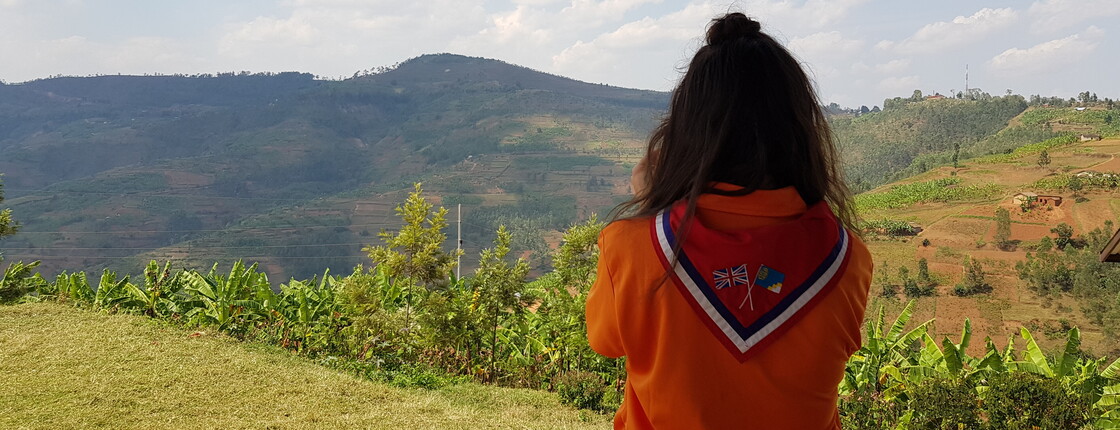Complaints procedure
How to make a complaint, what to expect, and how to respond to a complaint as a volunteer.
Last reviewed: 6 July 2022
It’s really important that Girlguiding volunteers, members, their parents or carers or anyone else can raise issues or problems.
How Girlguiding deals with concerns depends on what the concern is.
Feedback
We class comments made about Girlguiding that don’t relate to a specific incident or volunteer as feedback. We don’t investigate feedback using this complaints procedure. But we will acknowledge and respond to you as quickly as we can.
We welcome all feedback and review it regularly to find ways to improve. You can send feedback to [email protected].
Complaints with an informal resolution
Most complaints don’t need to go down the formal route, and can be resolved informally with your local leaders and commissioners. This is often the quickest and best way to deal with an issue.
Resolving complaints informally may be appropriate if a full investigation isn’t necessary, and there aren’t any concerns that someone has breached our policies or procedures.
Complaints you might resolve informally include concerns about joining enquiries, waiting lists or how activities are run.
If you think your complaint can be resolved informally, speak to your leader or local commissioner and try to work out a solution. If it can’t be, you can take it to our Complaints team at HQ, or to your country or region office.
If you’re not sure if your complaint can be resolved informally, you can go straight to our Complaints team at HQ. They’ll review your concern and decide if an informal resolution could be possible.
Formal complaints
If your complaints can’t be resolved informally, or it isn’t appropriate to raise it directly with your unit leader or commissioner, you should raise it with our Complaints team at Girlguiding HQ. This is known as making a formal complaint.
You must read about what kind of complaints our Complaints policy covers before contacting our Complaints team. As volunteers investigate complaints about local guiding timescales can vary.
As a volunteer, parents, carers, other volunteers or anyone else may make a complaint to you directly.
If you can, you should resolve the problem locally, without taking it to our Complaints team at HQ, or to your country or region. You’ve probably resolved complaints informally before without even realising it!
But if dealing with the complaint informally isn’t possible, contact the Complaints team. They’ll give you advice and start a formal investigation if necessary.
Some examples of complaints you could resolve informally include:
- A parent or carer complaining because their daughter didn’t get a badge.
- A parent or carer complaining about an activity at the unit meeting being too messy.
- A volunteer complaining because they didn’t get an important email about a district meeting.
- A local resident complaining that a parent or carer parked in front of their driveway.
- The manager of your venue complaining that chairs weren’t put back properly after your meeting.
You can deal with lots of issues just by having an open and honest conversation. You may need to explain why something happened, or acknowledge the impact on the person you’re speaking to.
Here are some more top tips for dealing with complaints:
- If appropriate, thank the person complaining for making their complaint. We can’t improve if people don’t let us know about problems they’re having.
- Decide the best way to communicate with the person complaining. Would it be easier to talk about and resolve the complaint in person? In an online meeting? Or by phone, email or text? Each way has benefits and drawbacks. What works for dealing with one complaint may not work for another.
- If you communicate by email or text think about how you word things to avoid misunderstandings. It can be easy to come across as rude or angry without meaning to.
- If it’s a more complex issue, you should offer to meet in person or have an online meeting. It doesn’t need to be a formal meeting, but try not to meet the person complaining alone. You could have a quick chat at the end of a unit meeting when other volunteers are still packing up. Or you could arrange a time to meet them in a local café or online with your commissioner. Make sure they know your commissioner will be joining you so it’s not a surprise. And let them know they can bring a friend or family member along too.
- After your in-person conversation or call, send a written summary of what you talked about and agreed. This is a good way to make sure everyone’s on the same page. Ask the person complaining to let you know if they disagree with anything you’ve written.
- Listen and ask questions to make sure you understand the issue.
- Find out how they’d like to resolve the issue. It may not always be possible to do as they ask, but you may be able to agree on a compromise.
- Acknowledge if a mistake has been made or if they’ve been impacted negatively by Girlguiding.
- Think about what you can put in place so something similar doesn’t happen in the future. Share any learning with others in your unit, division, district or county too. It might be appropriate to let the person who complained know what actions will be taken. If you’re not sure, check with our Complaints team at HQ or your country or region office before sharing.
- Keep notes of the actions you’ve taken and any you’ve agreed to take.
If someone is aggressive towards you or challenging to deal with, pass the complaint on to HQ. Let the person complaining know you’ve done this. Remember, you don’t have to deal with problems alone.
You can make a formal complaint by contacting our Complaints team in one of the following ways:
- Email us at [email protected]
- Fill in our online form. Make sure to choose ‘I have a complaint about Girlguiding’ from the list of options so your message goes straight to the team.
We know that sometimes it can be hard to put concerns into writing. If you don’t feel comfortable or confident doing this, you can send us an email asking for a call back and someone will get in touch.
We may still ask you to put your concern in writing. You don’t have to write this yourself. You can ask someone else to write it, but you’ll need to check what they’ve written and approve it before sending it to our Complaints team.
When making a complaint, you should include the following information – this will help us resolve it as quickly as possible:
- Your name, contact details, country or region, and your role in Girlguiding, if appropriate.
- Say you want to make a complaint.
- Who or what you’re making a complaint about, including names and membership numbers, if you know them.
- Where and when the events related to your complaint happened.
- The outcome you’re looking for by raising your complaint.
It would be helpful if you could also include:
- A short, clear summary. You could use bullet points and notes, so long as they follow a logical order .
- If you’re complaining about your daughter’s unit, please give us your daughter’s full name and date of birth so we can find her on our membership system.
- Any supporting documents or correspondence.
You must send any evidence you want to share with the investigator appointed to look into your complaint within ten working days of them contacting you. You can ask to extend this deadline – granting this is at Girlguiding’s discretion. If the investigator doesn’t get your evidence on time, we may decide we can’t continue our investigation.
We don’t expect you to prove the truth of what you’re saying. But you’ll need to give us enough information to understand what your complaint is about and to show it’s something we can investigate.
When making a complaint you don’t have to give your name or role if you don’t want to. We will respect this. However, we encourage you to, because it makes it easier for us to look into your concern.
You’ve got two options if you want to make a complaint anonymously:
Option 1: We’ll record your contact details, and share these with our Complaints officer and the volunteer leading the investigation. They’ll contact you before making any other enquiries or letting anyone else know about the complaint. During this first discussion they’ll make sure you’re happy with their proposed way forward and how they’ll keep in touch with you. No one else will be made aware of who made the complaint unless you agree to this.
Option 2: We’ll record the details of your complaint, but not your name or contact details. You’ll need to give us enough information to identify a specific volunteer or unit so we can look into your complaint. Our Complaints officer or the volunteer leading the investigation won’t be able to contact you to ask for more information or to tell you the outcome. Please note, we’ll have to inform the person you’ve complained about that a concern has been raised about them.
We’ll let you know we’ve received your message within five working days. If we’re receiving an unexpectedly high number of emails, we may take longer to answer. But we’ll let you know to expect this in our automatic response email, which you should get straight after you email us.
Once we’ve confirmed we can look at your concern under our Complaints policy, we’ll pass it on to be investigated locally, as set out in our Investigation procedure. This normally happens within five working days of your last contact with our Complaints team. The investigator will let you know they’ve received your concern and will discuss next steps with you.
We consider each complaint on a case-by-case basis and each will take a different length of time to resolve. The investigator will keep you updated on how your case is progressing.
If the complaint process is taking longer than anticipated, the investigator will let you know. They’ll also be in touch at least once a month until the complaint is closed, unless you agree something different.
If you’re involved in an investigation as the person complaining, a witness, accused party, or the person investigating, you may find it very stressful. We understand this and encourage you to seek support if you need to.
You can also contact our Complaints team to ask for support or adjustments so you’re able to take part in an investigation.
If you’re asked to come to a meeting as part of a complaint investigation, you’re welcome to have a supporter come with you.
We offer volunteers who are subject to a formal complaint support from a safe practice liaison volunteer within seven days of them being informed of the investigation. They offer emotional support to volunteers under investigation, acting as a sounding board and going to meetings with them when necessary.
If you’re not satisfied with how we’ve resolved your complaint you can contact our Complaints team to ask for an appeal, as set out in our Appeals and Review procedure. You must send your request in writing within 28 days of receiving your investigation outcome letter.
You can take complaints about some issues to outside bodies or regulators if you aren’t satisfied with our response.
- Data protection complaints – you can escalate complaints about data protection to the Information Commissioner’s Office (ICO). You should do this within three months of receiving Girlguiding’s final response about your complaint.
- Fundraising complaints in England, Wales or Northern Ireland - you can escalate complaints to the Fundraising Regulator. You should do this within two months of receiving Girlguiding’s final response about your complaint.
- Fundraising complaints in Scotland – you can escalate complaints to the Scottish Fundraising Adjudication Panel. You should do this within three months of the incident taking place.
- Gambling complaints – you can make a complaint about People’s Postcode Lottery (PPL) run on behalf of Girlguiding to the Complaints team at PPL as well as the Girlguiding Complaints team. If Girlguiding can’t resolve a complaint about gambling within eight weeks, we’ll refer it to our alternative dispute resolution provider, IBAS.
If you’re not happy with how we investigated a complaint, you can request a final review. You can find out more about this in our Appeals and Review procedure.
The decision of the final review is absolute – you can’t appeal it. It marks the end of a complaint. After the final review we won’t engage with the original complaint any further.



